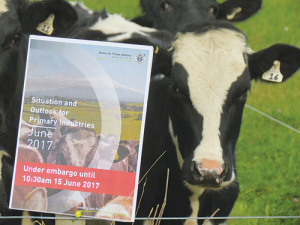Editorial: Happy days
OPINION: The year has started positively for New Zealand dairy farmers and things are likely to get better.
 MPI’s latest SOPI report says dairying will again dominate the primary sector’s contribution to the country.
MPI’s latest SOPI report says dairying will again dominate the primary sector’s contribution to the country.
A rise in dairy, forestry and horticultural exports spearhead the way for a big rise in the value of primary exports through to 2021, says the Ministry for Primary Industries (MPI) latest Situation and Outlook report.
It says primary exports will rise by 2.4% next year from $37.2 billion to $38b and by 2021 will reach $45b, an average growth rate of 3.9%. Despite a challenging year on farms, dairy exports in the next year are predicted to rise by 10.2%, forestry by 6.4% and horticulture by 5.9%.
Countering these gains is a predicted drop in meat and wool exports of 9.8%.
Over the next five years dairy, forestry and horticultural exports will continue to rise while meat and wool will largely plateau.
The growth predictions are based on the current recovery in dairy prices being maintained, general productivity rises and a large expansion of the horticultural sector, with new, high-value products coming on stream.
The MPI report paints an optimistic picture of future growth, citing economic growth in emerging, high-value markets and demand for the type of food NZ is producing, in particular meat, milk and fruit. It also notes that forestry is finding new markets in regions where there is high demand for construction materials.
But while MPI waxes lyrical about opportunities, it also warns that NZ has to get a better understanding of the dynamics of new markets. It notes in particular the rise and rise of e-commerce in China and the role and influence of the online platform Alibaba on traditional retail outlets.
It notes NZ’s four major markets are now China, Australia, the US and a combination of the EU and the UK. Interestingly, each of these economies have their own set of political or economic problems and the latest election result in the UK will cast another cloud of uncertainty across world markets to add to the disruption NZ already faces.
However, Jarrard Mair, MPI’s director of sector policy, is unfazed by this.
“The key thing to note is that each of those economies is still growing the demand for fresh clean product for human consumption.
“There are growing niches in each of those markets for our high-value products. Out of change there is always opportunity and as everything settles down they find their own new pathways,” Mair adds. “There will be opportunities for us. It will be developing niches and adding value to what we already do. The reality is that the consumer is still demanding NZ products.”
He says there’s been an improvement in businesses engaging with consumers, but he admits more needs to be done. MPI sees strong growth in NZ consumer brands and notes that many companies are investing in this area.
Oddball facts
- While NZ may be focusing on selling lamb to consumers, maybe they should be targeting feline consumers. MPI says that on a per (purr) gram basis, pet food made from lamb earns more than any other lamb cut in British supermarket.
- And if you didn’t already know it, infant formula exports have increased 160% over the past five years.
- Manawatu-Whanganui has more sheep and beef than any other region in NZ.
- NZ is the second-largest log exporter in the world.
- 2016-17 was the largest kiwifruit harvest ever recorded.
- NZ wine is the third-largest wine exporter to the USA by value.
- NZ produces about half the world’s carrot and radish seed.
The World Wide Sires National All Day Breeds Best Youth Camp Best All Rounder plaudit has become family affair, with 2026 Paramount Cup winner Holly Williams following in her sister Zara's footsteps.
DairyNZ is giving New Zealand farmers a unique opportunity to gain hands-on governance and leadership experience within the dairy sector.
Herd improvement company LIC has posted a 5.2% lift in half-year revenue, thanks to increasing demand for genetics.
According to the latest Fresh Produce Trend Report from United Fresh, 2026 will be a year where fruit and vegetables are shaped by cost pressures, rapid digital adoption, and a renewed focus on wellbeing at home.
The Roar is a highlight of the game hunting calendar in New Zealand, with thousands of hunters set to head for the hills to hunt male stags during March and April.
OPINION: The past few weeks have been tough on farms across the North Island: floods and storms have caused damage and disruption to families and businesses.

OPINION: Meanwhile, red blooded Northland politician Matua Shane Jones has provided one of the most telling quotes of the year…
OPINION: This old mutt has been around for a few years now and it seems these ‘once in 100-year’ weather…